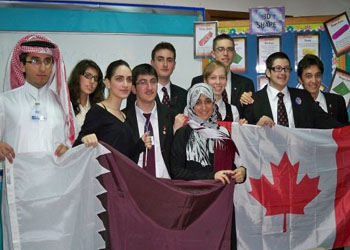 11/15/10 – Students can get involved in extracurriculars at various levels. Smaller scale clubs offer something fun to do after school, such as ceramics in Art Club or making crystals in Chemistry Club. Some clubs also include competitive elements, such as math contests, Science Olympics, and DECA conferences. Most often, clubs with competitive elements offer various levels of competition depending on commitments and talent, from intra-club events to school-wide contests, or even district or provincial/state level competitions. Few extracurriculars offer anything past the national level in terms of events, as anything further requires months to years of commitment and usually a high financial burden – but the rewards are huge.
11/15/10 – Students can get involved in extracurriculars at various levels. Smaller scale clubs offer something fun to do after school, such as ceramics in Art Club or making crystals in Chemistry Club. Some clubs also include competitive elements, such as math contests, Science Olympics, and DECA conferences. Most often, clubs with competitive elements offer various levels of competition depending on commitments and talent, from intra-club events to school-wide contests, or even district or provincial/state level competitions. Few extracurriculars offer anything past the national level in terms of events, as anything further requires months to years of commitment and usually a high financial burden – but the rewards are huge.
Pam Cohn is a graduate of Richmond Hill High School, an alumni of the University of Toronto, and is currently studying at Durham University in England. She is one of the few who chose to go beyond the standard level of competition extracurriculars provide and competed internationally in debate as part of Team Canada.
Q: How did you first get interested in Debate?
A: When I entered high school, I made sure to join as many clubs and teams as I could to get myself engrossed in the school and its community and to find my niche in the new school environment. I had always been a rather argumentative child- my parents often regale me with tales of me arguing with my sparks leaders at age five for hours about the placement of the arts and crafts tables until I got my way. So, debating was something that was at the top of my list to look into once I got to high school.
Q: How did you get into Team Canada? Any interesting stories?
A: On a basic level, I had never left North America, and the travel opportunities the team would offer me was one of the smaller yet still very real attractions of the team. On another level, just the sheer idea of the level of competition egged-on my competitive side and enticed my academic curiosity. I also was drawn in by the cultural exchange that would take place at an international summit of that magnitude. The idea of national teams from the far-reaches of the world meeting to question and argue about controversial issues brought about a unique drive in myself to see and experience such a unique and amazing clash of cultures.
I got onto Team Canada simply through hard work and determination. I trained myself for at minimum 6-8 hours/day during the school year and about 13 hours/day during the summer every single day from the summer before grade ten onward in debating. In grade eleven I qualified for the 2009 Canadian National Debating Team, and that summer I was chosen as one of the five members of the world’s squad that would make Team Canada at the World Schools’ Debating Championships in Athens, Greece that February. In Athens, the team made the quarter-finals before taking a split-loss to that year’s champions; New Zealand. After this, I went on to come top speaker at the largest, most competitive schools’ competition in the world- Durham Schools.
Q: Where are you studying now, and what are your future ambitions?
A: I am currently at Durham University in the UK taking a degree in politics and economics with a concentration on Middle Eastern and Islamic studies. After this degree, I hope to continue my education with a masters in Comparative politics with a concentration on Africa and then get a Ph.D. before finding myself on the job market. I often joke that my life’s ambition is to rule the world, but in fact I just hope to find a way to change it for the better in some capacity. My ambitions are rather varied, I would like to do some political development work in Africa or, alternatively, work at the ICC or the ICJ. My ambitions are centred around justice and opportunity for the disenfranchised and helping foster fairness in the most disparaging areas of the world.

